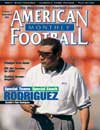AMERICAN FOOTBALL MONTHLY THE #1 RESOURCE FOR FOOTBALL COACHES
Article CategoriesAFM Magazine
|
On A MissionMaryland\'s Ralph Friedgen is determined to make his alma mater a winner© More from this issue It's 8:30 on a humid Friday morning in June, and Ralph Friedgen looks frazzled, as if he's already worked his standard 18-hour day. Sweat sits on the face of the 54-year-old, who appears out of breath when arriving at his University of Maryland office. For the Terps new football coach, the morning has been about three hours old - and hectic at that. Friedgen chased down three of his freshmen to get them to their academic tutor on time and coordinated details for Maryland's ongoing high school football camp, among other mundane coaching-related tasks. Doesn't sound too glamorous. But this is the job that Friedgen, a Maryland alumnus who spent 31 years as an assistant coach, including two stints with the Terps, eyed for a long time. He thus finds no qualms making the tough sacrifices necessary for a head coach. "I'm going to get....The full article can only be seen by subscribers.
|
|
|||||||
| HOME |
MAGAZINE |
SUBSCRIBE | ONLINE COLUMNISTS | COACHING VIDEOS |
Copyright 2025, AmericanFootballMonthly.com
All Rights Reserved





